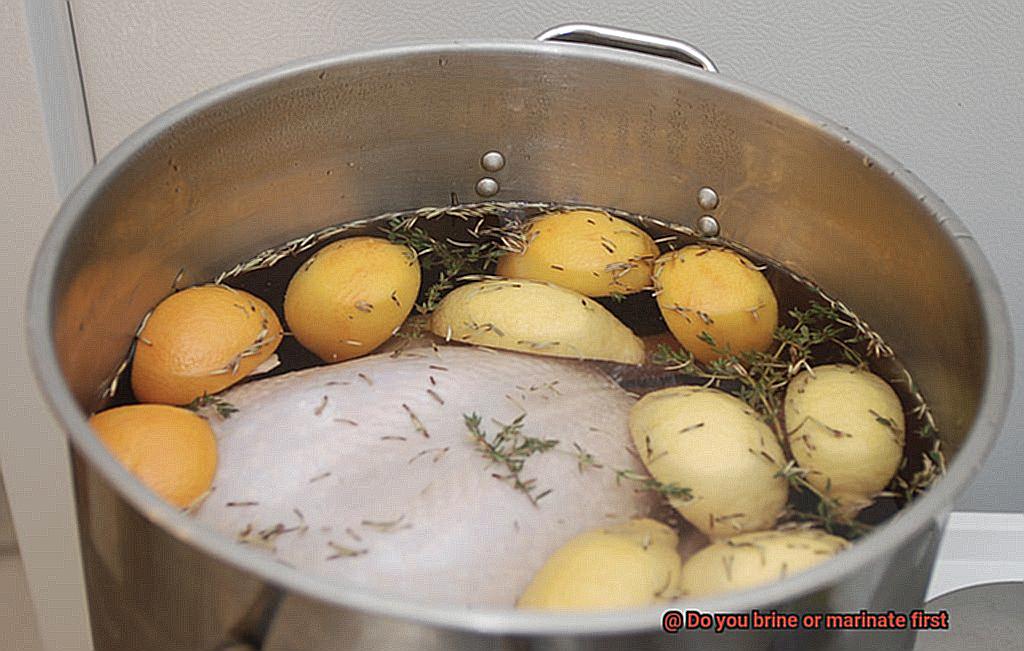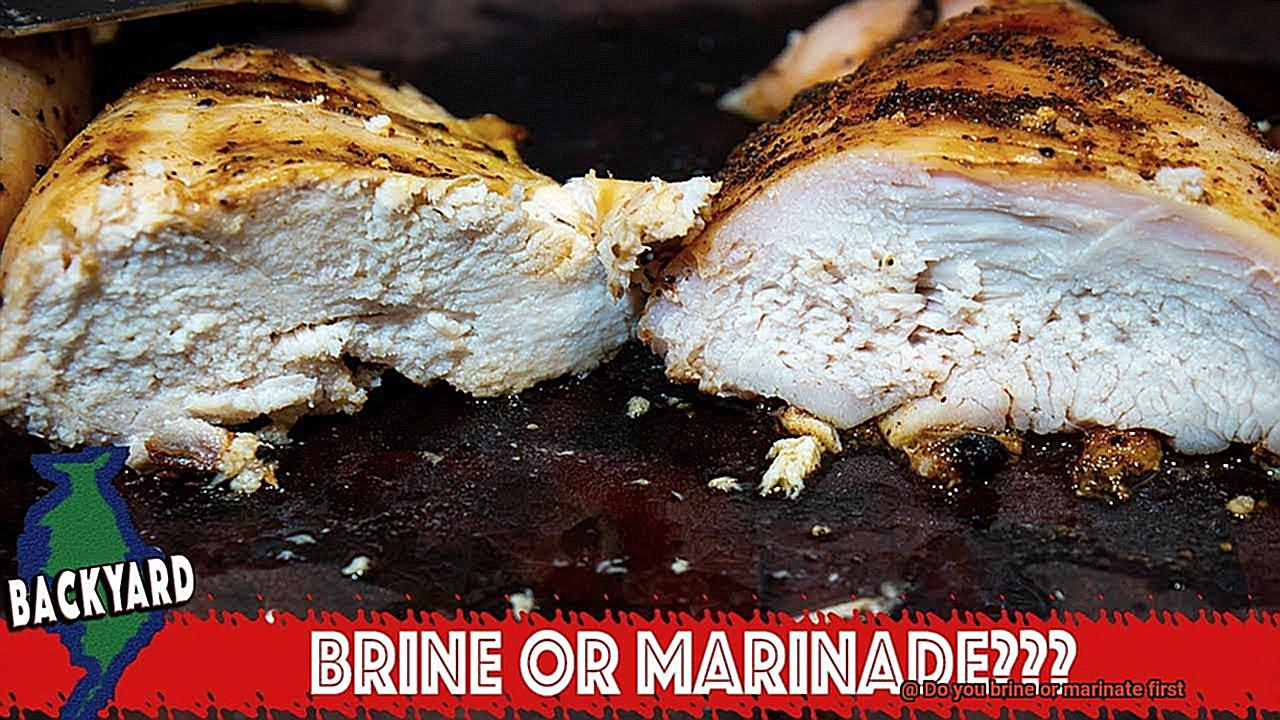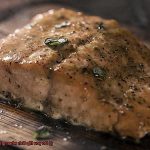Are you a cooking novice or a seasoned pro looking to up your game in the kitchen? Either way, if you’re wondering whether to brine or marinate your meat first, you’ve come to the right place.
The age-old debate over whether to brine or marinate first can leave even the most experienced cooks scratching their heads. Brining enthusiasts swear by its ability to produce tender and juicy meat, while marinade devotees believe that it’s all about flavor.
So, how do you know which method is right for your dish? And what’s the difference between the two techniques anyway?
In this blog post, we’ll dive deep into the pros and cons of both methods, debunk some common misconceptions, and offer up some insider tips and tricks to help you make an informed decision. Plus, we’ll share some mouthwatering recipes that showcase each technique.
Whether you’re cooking up chicken, pork, beef, or something else entirely, get ready to take your culinary skills to new heights. With our guidance, you’ll be able to impress your taste buds – and those of your guests – like never before. So without further ado: do you brine or marinate first? Let’s find out.
Contents
What is Brining?
This simple yet effective technique involves soaking meat or poultry in a saltwater solution before cooking it, resulting in juicy and flavorful results.
To create a brine, combine water, salt, sugar, and any desired herbs or spices. Submerge your meat in the solution and let it soak for several hours. The salt will penetrate the meat fibers and break down proteins, resulting in a more tender and flavorful piece of meat.
Brining is particularly useful for lean cuts of meat such as chicken breasts or pork chops that tend to dry out during cooking. By brining these cuts of meat, you can ensure that they remain moist and full of flavor, even when cooked at high temperatures.
However, it’s important not to over-brine your meat, as this can result in an overly salty or mushy texture. Be sure to adjust your seasoning accordingly when cooking with brined ingredients.
Aside from enhancing the flavor and tenderness of your meats, brining also adds versatility to your cooking. You can experiment with different flavor profiles by adding various herbs and spices to your brine solution.
What is Marinating?
Well, marinating is here to save the day. Marinating is a popular method of flavoring meat, poultry, and seafood that involves soaking the food in a mixture of acidic ingredients, herbs, spices, and oils. This technique infuses the meat with flavor and tenderizes it, making it more enjoyable to eat.
Acidic ingredients like vinegar, lemon juice, or wine are the key to making your meat tender. These ingredients break down the proteins in the meat, making it easier to chew. The herbs, spices, and oils add an explosion of taste and aroma to your dish.
But don’t worry about drying out your meat. Over-marinating or marinating for too long can make your meat dry and tough. Follow the recipe carefully and stick to the recommended marinade time.
There are countless types of marinades out there to suit any taste preference. From classic Italian marinades with olive oil, balsamic vinegar, garlic, and rosemary to Mexican-style marinades with lime juice, chili powder, cumin, and oregano – the possibilities are endless. Experiment with different flavors and find your favorite.
Before you get started with marinating, remember one crucial detail – use a non-reactive container like glass or plastic. Reactive containers like aluminum or cast iron can negatively affect the marinade and ruin your dish.
Benefits of Brining
As an expert in the benefits of brining, I can attest to its ability to transform your meat, poultry, or fish into a juicy and flavorful masterpiece.
Firstly, brining is a process that involves soaking your meat in a saltwater solution infused with herbs and spices before cooking. This allows the meat to absorb extra moisture that prevents it from drying out during cooking. The result is an end product that is succulent, flavorful, and moist. Brining is especially important for lean cuts of meat like chicken breast or pork loin that tend to dry out quickly.
Brining also enhances the flavor of your meat by infusing it with the flavors of the brine solution. The salt and other seasonings in the brine solution are absorbed into the meat along with the moisture, resulting in a deeply flavorful end product. You can also experiment with different herbs and spices to create unique taste combinations.
In addition to retaining moisture and enhancing flavor, brining can also tenderize tougher cuts of meat, making them more enjoyable to eat. The salt in the brine solution breaks down the muscle fibers slightly, allowing them to absorb water more easily. This extra moisture helps to prevent overcooking while simultaneously tenderizing the meat.
Benefits of Marinating
It’s time to take your grilling game to the next level with the art of marinating. As an expert in the benefits of marinating, I am excited to share with you the many advantages of this simple yet effective technique.

Firstly, marinating is an excellent way to add a burst of flavor to your meat. By soaking your meat in a seasoned liquid, you can infuse it with a variety of flavors and aromas. From tangy citrus juices to fragrant herbs and spices, the possibilities are endless. And the best part? The longer you marinate, the more intense the flavor becomes.
But that’s not all – marinating can also tenderize even the toughest cuts of meat. The acid in the marinade breaks down the protein fibers, resulting in a tender and juicy end product. However, be careful not to over-marinate as too much acid can have the opposite effect.
In addition to adding flavor and tenderness, marinating can also help prevent your meat from drying out on the grill. The liquid in the marinade acts as a protective barrier, keeping your meat moist and succulent. And if you’re using a marinade with sugar in it, you’ll end up with a caramelized crust on the outside, adding another layer of texture and flavor.
To ensure that your marinating experience is safe and successful, it’s crucial to follow food safety guidelines. Never leave your meat out at room temperature for too long and always store it properly.
Deciding Whether to Brine or Marinate First
If so, you may have wondered whether to brine or marinate your meat first. Fear not, as we explore the differences between these two techniques and help you decide which one to choose.
Let’s start with brining. This process involves soaking meat in a saltwater solution for an extended period before grilling. The saltwater permeates the meat’s cells, adding moisture and enhancing its natural flavor. As a result, brined meat is juicy, tender, and tasty.
On the other hand, marinating involves soaking meat in a mixture of acidic ingredients like vinegar or citrus juice, along with herbs and spices. Marinating adds a burst of flavor to your meat while also breaking down its fibers, resulting in a tender texture.
So, which technique should you use first? It primarily depends on your desired outcome. If you’re aiming for moist and tender meat with a subtle taste, brining is the way to go. However, suppose you prefer bold flavors that enhance the natural taste of the meat. In that case, you should marinate first.
It’s crucial not to combine both techniques as it can lead to over-seasoned and overly moist meat. Stick to one technique that aligns with your desired outcome.
Here are some additional tips to keep in mind:
- Brining is ideal for lean cuts of meat like chicken breasts or pork chops.
- Marinating is perfect for fattier cuts like ribeye or skirt steak.
- Brining takes longer than marinating. Plan accordingly and give yourself enough time.
- Use a brine or marinade recipe that complements the flavors of your meat.
- Don’t forget to pat dry your meat before grilling to ensure crispy crusts and even cooking.
Different Types of Meat and Their Preferred Method
When it comes to grilling meat, there’s more to it than just tossing it on the grill and hoping for the best. Each type of meat requires a different approach to achieve the desired flavor and texture. Let’s explore the different types of meat and their preferred grilling methods.
Chicken
Chicken is a great choice for grilling, but it can easily dry out on the grill. Brining is an effective method to keep chicken moist and flavorful. A basic brine consists of water, salt, sugar, and spices. Another option is marinating chicken in a citrus-based mixture to add flavor. The acid in the marinade helps to break down the protein in the chicken, resulting in a tender and juicy final product.
Beef
Beef is another popular meat for grilling, but it can be tough if not prepared properly. Marinating before grilling is the preferred method for beef. The acidity of the marinade helps to break down the tough fibers in the meat, resulting in a more tender and flavorful steak. Soy sauce-based marinades are popular for beef, as are red wine and balsamic vinegar-based ones.
Pork
Pork is a versatile meat that can be prepared by either brining or marinating, depending on the cut of meat. Leaner cuts like pork chops benefit from a brine to keep them moist, while fattier cuts like pork shoulder can handle a stronger marinade. Regardless of which method you choose, pork is a great option for grilling as it pairs well with a variety of flavors.
Seafood
Seafood is another type of meat that requires careful consideration when grilling. A marinade is generally the way to go because fish can easily become overpowered by a brine. A simple marinade of olive oil, lemon juice, garlic, and herbs is great for grilled fish. It’s important to keep an eye on the fish while grilling as it cooks quickly and can easily become overdone.
Lamb

Lamb is a flavorful meat that is perfect for grilling. It’s important to marinate lamb before grilling to ensure that it remains tender and juicy. A mixture of olive oil, garlic, rosemary, and lemon juice is a classic marinade that pairs well with lamb.
Tips on How to Brine and Marinate Properly
Brining and marinating are two techniques that can take your grilled meats to the next level. However, it’s important to understand the differences between the two and how to use them properly for the best results. Here are some tips to help you get started:
Brining vs Marinating
Brining involves soaking meat in a saltwater solution, while marinating involves soaking meat in a seasoned liquid. Brining is best for adding moisture and tenderness to your meat, while marinating is perfect for adding flavor.
Choose Your Meat Wisely
Poultry like chicken and turkey tend to benefit more from brining, while beef and pork may benefit more from marinating. However, this is not set in stone, so feel free to experiment with different meats and techniques to find what you prefer.

Use Non-Reactive Containers
When brining or marinating, always use non-reactive containers such as glass or plastic. Reactive materials like aluminum or copper can alter the flavor of your meat.
Don’t Overdo It
Be careful not to brine or marinate your meat for too long, as this can result in an overly salty or acidic final product. Generally, a few hours is enough time for most meats.
Rinse Off Your Meat After Brining
After brining, rinse off your meat thoroughly to remove any excess salt.
Experiment with Flavors
The possibilities for flavors when brining or marinating are endless. Try different combinations of herbs, spices, acids, sugars, and liquids to find your favorite flavor profile.
Combine Techniques
If you want to use both brining and marinating together, try brining your meat first, rinsing it off thoroughly, and then marinating it for several hours before cooking. This allows you to get the benefits of both techniques without overwhelming your meat with too much salt or acid.
Common Mistakes Made When Brining or Marinating
Brining and marinating are two techniques that can elevate the flavor and texture of your meat before grilling. However, make sure to avoid these common mistakes that can ruin the outcome of your dish.
Firstly, over-brining or over-marinating is a common mistake that many people make. Leaving your meat in the brine or marinade for too long can result in the meat becoming too salty or too acidic, ruining its flavor and texture. To prevent this, follow the recipe’s instructions for how long to brine or marinate your meat and avoid exceeding the recommended time.
Another mistake is not using enough salt in your brine solution. Salt is a crucial ingredient that helps tenderize the meat and enhances its flavor. However, many people make the mistake of not using enough salt in their brine solution according to the recipe. So, ensure that you use the correct amount of salt.
Using a metal container when brining or marinating is a big no-no because it can react with acidic ingredients in the brine or marinade, affecting the flavor of your meat. Instead, opt for non-reactive containers such as glass or plastic.
Properly drying off your meat after removing it from the brine or marinade is also important. Excess moisture can prevent the meat from browning properly and cause flare-ups on the grill. So, always dry off your meat before grilling for even cooking and delicious browning.
Finally, reusing leftover brine or marinade is another mistake to avoid. This can cause cross-contamination and increase the risk of foodborne illness. It is crucial always to discard leftover brine or marinade.
hI7k_sXzaFo” >
Conclusion
In the world of grilling, the debate between brining and marinating first is a classic conundrum. But fear not, understanding the nuances of these two techniques can take your BBQ game to new heights.
Brining is a great option for lean meats like chicken breasts or pork chops. By adding moisture and tenderness while enhancing flavor, it can turn even the driest cuts into juicy delights. Marinating, on the other hand, is perfect for fattier cuts like ribeye or skirt steak. It infuses meat with bold flavors and enhances its natural taste.
To ensure success with either technique, it’s important to choose your meat wisely and use non-reactive containers. Overdoing it can lead to overly salty or overpowering flavors, so experiment with different combinations until you find what works best for you. And don’t forget to properly dry off your meat before grilling.
Avoid common mistakes like reusing leftover brine or marinade and not using enough salt in your solution. These missteps can lead to unwanted bacterial growth or bland results.
Whether you’re a seasoned pro or just starting out in the kitchen, brining and marinating are two techniques that will elevate your grilled meats to mouthwatering masterpieces.






